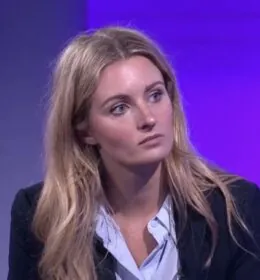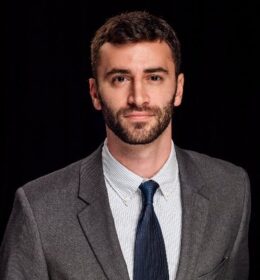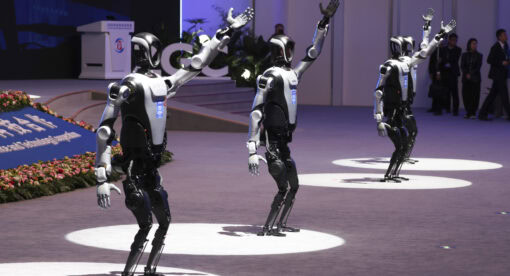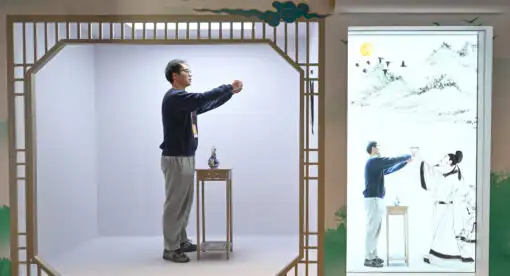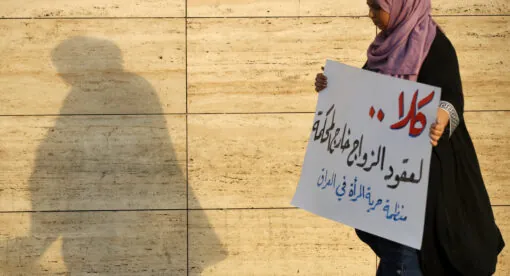In the latest episode of the New Lines Institute’s Contours podcast, Program Head and Senior Analyst Caroline Rose interviews Jim Townsend, Rachel Rizzo, and Eugene Chausovsky on transatlantic security in light of the conflict in Ukraine. Townsend is an adjunct senior fellow in the Center for a New American Security’s (CNAS) Transatlantic Security Program and the former Deputy Assistant Secretary of Defense for European and NATO Policy. Rizzo is an adjunct fellow in the CNAS Transatlantic Security Program. Her research focuses on European security, NATO, and the transatlantic relationship. Chausovsky is a Senior Analyst and Program Head for Training and Analytical Products at the New Lines Institute; his research focuses on Central Asia and Eurasia. Their conversation covers new applicants to NATO, Russia’s perceived threats, and how transatlantic security will be affected by the outcome of the conflict in Ukraine.
Caroline Rose: Hello, and welcome to this latest episode of the New Lines Institute for Strategy and Policy podcast series Contours. Today, I’m thrilled to be joined by three of the best strategic thinkers on European security to discuss the shifting dynamics and security landscape within NATO, amidst Russia’s continuing war on Ukraine. First, we have Jim Townsend, an Adjunct Senior Fellow in the Center for New American Security’s Transatlantic Security Program. Townsend served eight years as Deputy Assistant Secretary of Defense for European and NATO policy, as well as the Vice President of the Atlantic Council of the United States and Director of the Council’s program on international security, as well as holding a distinguished civil service career at the Pentagon and at NATO. Townsend has completed more than two decades of work on European and NATO policy and has greatly contributed to the Transatlantic security ties we know today. We’re very excited to welcome him back to the Contours podcast.
We would also like to welcome back Rachel Rizzo, a non-resident Senior Fellow at the Atlantic Council’s Europe center, where she focuses on European security, NATO, and the Transatlantic relationship. Prior to joining the Atlantic council, Rizzo served as the Director of Programs at the Truman Center for National Policy and the Truman’s National Security Project, as well as a Robert Bosch fellow in Berlin, where she worked at the Berlin office on Human Rights Watch and served as an adviser to a member of the German Bundestag, as well as five years at the Center for a New American Security as an Adjunct Fellow. Welcome back, Rachel. And finally we have Eugene Chausovsky, a Senior Analyst and Program Head of Training and Analytical Products at the New Lines Institute for Strategy and Policy. Eugene previously served as a Senior Eurasia Analyst at the geopolitical intelligence firm Stratfor for over 10 years.
His work focuses on political, economic and security issues pertaining to Russia, Eurasia, and China. He lectures on the geopolitics of Central Asia at the U.S. Department of States Foreign Service Institute. It’s so wonderful to have you all with us. I’d like to start with you, Jim, you wrote earlier in this crisis that we should start viewing sanctions not as a measure that could achieve deterrence per se, but as a punitive tool. And so with this in mind, what’s the space and how should the United States and its partners in Europe proceed? Particularly as we’re seeing this shift with Russia pivoting its attention eastward, where would you see the space for action for Europe and the United States?
James Townsend: Well, I think in terms of sanctions, there’s sanctions and then there’s the military assistance. In a lot of ways, the military assistance is a bit of a sanction, too, in a different sort of way. But I think in terms of what’s happening in the East, we’re not going to deter that from happening. I think the deterrence role of sanctions, deterrence roles of various tools that we were using before the invasion, obviously they didn’t work. He was not scared off enough to be deterred from invading Ukraine. He’s gone into Ukraine, he’s doing what he wants to do in Ukraine. He’s adapting to the battlefield there, he’s adapting to how the west has responded. He’s adapting to how the Ukrainian military and the political side has responded. So he’s not being deterred from anything.
And so what we’re faced with is saying, okay, well, you weren’t deterred, you’ve gone in there, now you’re going to really feel the pain. And so in terms of the sanctions part, the economic sanctions, financial sanctions, as we all know, we put in these sanctions in a way that we’ve never done in the past. And they’ve had a major impact even in the short term, because sanctions usually take a long time to take effect. But in the short term, it’s really doing a number now on the Russian finances, on their economy. It hasn’t caused Russia to collapse and I’m not so sure that’s in the near or midterm, but certainly the pain from sanctions is much worse than Putin thought he was going to get, and it has the capability to get worse. And so as we look at Russia doing things like using chemical weapons, or we look at more war crimes and this type of thing, I think sanctions will be rolled back out again to put pain on him, on Putin, and on Russia, and on the Russian people, in response to doing these things that we’ve warned them not to do.
It’s something we can’t ignore. We can’t draw a red line on chemical weapons and not do anything about it. And I think sanctions right now — as long as military operations are off the table, sanctions are going to have to go in — and there’s still some room there, I think in some of the sanctions, particularly financial sanctions and energy, where they’re going to have to really go and tighten screws down even harder in response to the chemical side. On the military side, though, this is also something to make Russia feel pain. In other words, we’re going to make you feel pain on the economic side and on the military side, we’re going to help Ukraine make sure you don’t achieve your military goals. And that’s been successful as well.
The fight that we’re going to see in the East is going to be something much different than we’ve seen so far. It’s going to be really a terrible war of attrition. We can talk about that, but as we are in this interregnum right now, we’re watching the Russians rebuild. We’re watching them reestablish a critical mass in Eastern Ukraine, beginning to roll through the Donbas. We’re rushing in more sophisticated weapons now to help the Ukrainian army deal with this new kind of warfare, in a sense, that they’re going to face that’s different from what they faced in Kyiv, and it’s as well in the south. So I think when it comes to sanctions, when it’s, military side and economic side, we’ve done pretty well and there’s still a lot of room for maneuver as we need to tighten screws based on what kind of pain we need Russia to feel, based on some of the egregious actions that we’ll see them doing in the future.
CR: Thanks, Jim. You mentioned a very interesting point regarding the space left for action among European partners when it comes to sanctions, particularly in the energy sector, and Germany has been certainly a country that has received a lot of attention on the space for action and of course becoming a proactive actor in pressuring Russia in Ukraine, but then also, of course, reducing at large European dependence on Russian gas sources. And Rachel, I know you just came back from Germany. You’ve done a lot of work on Germany and have like many others been very, very taken aback by this sudden sea change in Germany’s posture regarding Ukraine. But I remember recently you were on an interview and you talked about how there needs to be momentum in this policy as well. How do you see this momentum evolving in Germany? Do you think that Germany will be able to keep up this different defense policy? How, of course, do you see Germany changing its policy on its energy dependence, and then also of course playing a role in the European defense community and within NATO moving forward with developments in Ukraine?
Rachel Rizzo: Well, I mean, you’re definitely asking all the right questions, all the big questions. I think what we’ve seen from Germany has been pretty impressive over the last six or seven weeks. I’ve said this before, but I think it’s worth repeating, the speech that we heard Olaf Scholz give to the Bundestag just days after Russia began its invasion of Ukraine was surprising. I think it would’ve been unthinkable just a couple of months ago. So seeing the shift from Germany in a matter of days, I think was surprising for everyone. This doesn’t just include a $100 billion fund for defense investments, but it talks about suspending the Nord Stream 2 pipeline, which wasn’t running gas through it yet, but it was sort of stuck in German purgatory and the German government went ahead and suspended it altogether. And they also did a 180 on a long-held policy not to export weapons into conflict zones.
And so, a lot of major shifts in German foreign policy, just in a matter of days and weeks and these debates are still going on, right? And I think the major question now is, is it sustainable? And what does sustaining these policies actually look like? It’s one thing to make a speech in front of the Bundestag talking about an extra hundred billion dollars for defense spending, but it’s quite another to change Germany’s mindset on the role that it believes it should play, not just as a member of NATO or the European Union but as the largest economy in Europe and as a global actor.
And we’re already seeing, I think, some of the issues that come along with a sea change of this proportion. There have been back and forth discussions about whether or not Germany is going to send tanks to Ukraine. We’ve seen some wavering on what embargoing Russian energy to Germany might look like and the very clear possibility that this would cause a pretty serious recession for the German economy and the desire of politicians and government leaders to avoid this scenario — while at the same time, knowing that they have to do more, that they are going to be under increasing pressure to do more. And so I think that what we’ve seen is, there are good indications thus far, but I think over the coming weeks and months is where the rubber is really going to hit the road. And it’s going to give us, I think if not a clear picture, a clearer picture of where Germany might go in the coming months and years.
CR: Yes. Thank you, Rachel. It’s definitely clear that the security architecture within the alliance and within European security at large is being transformed, and I think Germany’s been a very key and a major actor in this shift. Now, Eugene, I want to turn to you because we’ve had some conversations over the past week about how Baltic security is being altered. And just yesterday, one of President Vladimir Putin’s closest allies warned NATO that if Sweden and Finland joined the United States-led military Alliance, then Russia would have to bolster its defenses in the region, including by deploying nuclear weapons. Now, of course, I know that you’ve been closely watching developments in Belarus and then also, of course, Russian forces in Kaliningrad. How do you see Russia’s posture evolving as the security architecture in the Alliance is shifting? Are you concerned about NATO borders with Belarus? Do you think that Belarus is going to become a major flash point between Russia’s tensions with the west?
Eugene Chausovsky: Thanks, Caroline. Well, I would say that it’s certainly concerning anytime you have Russian officials or officials from anywhere threatening the deployment of nuclear weapons. I will say, though, that when Russia talks about deploying these in the Baltic region, it kind of depends on where they’re talking about because we’ve seen officials from Lithuania, for example, say that Russia already has nuclear weapons pre-positioned in an area like Kaliningrad. But I think all of this just goes to show how these security threats have really built up on each other. And you bring up Belarus and I think it’s a really important country in this context because Belarus played a very important role, obviously in terms of Russia’s military operations in Ukraine, basically allowing Russia to station its forces and deploy onto the Kyiv axis, which they’ve now pulled back. But that remains a very important component of this conflict.
But Belarus had seen a lot of tensions with NATO countries building up to this Ukrainian conflict. We had the refugee issue, basically Belarus weaponizing those refugees onto countries like Poland and the Baltic states. But also Belarus, really feeling threatened by NATO’s own military buildups, which is, I think one of the reasons why Belarus did join this conflict, although not on the ground in Ukraine. So really, what we have here is this tit for tat, essentially, security buildups, and I think the real challenge here is to make sure that these tensions don’t actually spill over into actual conflict. Because once you bring in a country like Belarus, and especially NATO countries, and you have direct conflict between Russia and NATO, which, so far Ukraine is just a proxy conflict, essentially, that’s when things get really serious. So I think that’s kind of the challenge for both, NATO countries, but also for Russia itself, despite its nuclear threats, to make sure that those don’t actually materialize into something concrete on the ground.
CR: Absolutely. Thank you, Eugene. Now I want to address the elephant in the room here, something that has definitely been defining this week in terms of developments in Ukraine and in relations with Russia, and that is the developments that have been happening in Sweden and Finland with NATO membership. And Jim, I know that you’ve worked quite a bit on this, and now both countries seem to be on track to join the Alliance as early as summer, with Finland the most forward-leaning and Sweden very close behind. And with this, we’ll see the emergence of a significant Nordic bloc, potentially, in the alliance. How do you think that this could shift the alliance’s posture? And I recall you earlier talking about potential backups, for example, a triangular U.S.-Swedish-Finnish relationship. Do you think that these countries are considering backups, or do you think that they are very serious about NATO membership? And how do you see this progressing over the summer?
JT: You raise an important point, this idea that, can there really be a plan B instead of NATO membership? And I think that’s what the Swedish Social Democrats are beginning to think about right now. In Finland, they are absolutely focused on joining NATO. There’s not a discussion of a plan B or a Finnish-Swedish alternative, or a trilateral alternative with the U.S. involved, and the U.S. isn’t thinking about that either, believe me. So I think really that plan B idea is in Stockholm where the Social Democratic Party and some of the politicians in there still are having trouble with such a big move for Sweden. They’re having to go through a process that’s slower moving than the Finnish one. They’ve got personalities and politics that are getting in the way, for sure.
And so as part of the thought process, they’re thinking, well, is there a way in that Sweden can come up with a way to defend itself without joining NATO? Maybe we could do something even more involved and deeper with Finland? They already have a military relationship that they developed with the past couple of years, not quite an alliance, but close to it. And maybe they’re going to say, let’s do something even more with Finland. Let’s bring in the U.S., Let’s find some other way to do it. Something that might cause us trouble, like joining NATO. And there really isn’t a plan B, I think that’s just a fantasy, frankly, that, that some in the Swedish Social Democratic Party are grasping at because they feel uncomfortable joining NATO. I think they are going to be washed away by sentiment in Sweden, in terms of the people as well as other political parties, as well as politicians in the Social Democratic Party there. I think they’re going to, I think NATO is going to be in their future and plan B is just a road bump on their way, on their way there.
And in terms of its impact at NATO, I mean, there’s so much positive that’s being brought into the Alliance in terms of how easily it is to work with these two countries politically around the table at NATO. And that’s not a small thing, there’s some countries that are very difficult to work with. I think, I think Swedes and Finns are much better able to compromise and to come up with approaches that everybody can live with politically, and they bring a lot of smarts. And militarily, we have not had new allies as interoperable and as capable as Swedes and Finns are, coming into the Alliance. They bring a lot immediately. They become producers of security more than they are consumers of it. So in terms of NATO’s operations militarily, in terms of its family life at, around the Alliance table, politically, they’re going to do very well.
And it’s going to bring stability to the Nordic-Baltic region, and I say that because when you have a solid alliance flank up there, with everyone working together, with everyone coordinated via NATO, et cetera, you’re not going to have any question marks about where neutral countries might be, or non-aligned countries might be. And that’s been in the past something that planners in Moscow — they would look at Finland and Sweden and they would say, well, these guys will stay out of any conflict that we might have with the Balts or whatever, but instead, I think planners in Moscow are going to have to deal with the fact that if they mess with the three Balts, they’re going to have to deal with Sweden and Finland and their geographic proximity and their militaries, if they’re in the alliance.
So, I think if anything, it brings deterrence stronger in the Nordic region, it brings stability stronger there. And the various warnings that the Russians are spewing right now about Kaliningrad and nuclear weapons, we’ve heard that before. The assumption has been for years that they had nuclear weapons in Kaliningrad, they had the Iskander missile there, which can carry a nuclear warhead. So these are pretty empty. And I think Sweden and Finland have had to deal with Russian misinformation long enough, disinformation, so that they know how to, the people know how to deal with it. I think we just have to keep pressing forward, Finns in the lead, and I think the Swedes will be behind them as well.
CR: Absolutely. Rachel, did you also want to add to that? I’m curious, because I know that you’ve also been following this very closely, and particularly with the dynamics, I’m curious how this might affect the blocs that we’ve seen within NATO and then also of course, the EU. I think that we all remember back in 2020 at the NATO summit, when a lot of NATO activities and a lot of the discussion was being held hostage by tensions in the Eastern Mediterranean, and I’m curious, are, are we going to see that at future NATO summits or is that dynamic at least temporarily dead?
RR: Well, I would say a few things. The first is what this means for NATO concretely is — I agree with everything that Jim said — but the border between NATO countries and Russia when Finland joins, if and when, is going to more than double. Right now it’s at, I think around 754 miles, it’ll go up to 1,600 miles, and so that’s a significant change. We’re also seeing this sort of reaction that we would expect from Russia. This is not a surprise. It’s not a surprise that Russia is nuclear saber-rattling. We should expect more information warfare. These are things, as Jim mentioned, that people have prepared for, they have experience with. This is, this is unsurprising. I think what’s interesting too, is — there are a couple things. The first is, a lot of people, I would consider myself in this group, who have worked on NATO, but who have all always been a little bit skeptical of NATO enlargement, a lot of us are starting to re-examine our priors. If you had asked me a couple of months ago, if I thought that Finland and Sweden should join, I don’t think I would’ve been alone in saying, eh, I don’t know if it’s a great idea. And I don’t know if I ever see it happening. That’s changed pretty quickly. And so it’s been interesting to watch, not just how quickly public opinion in these countries has shifted, but sort of how the policy community is thinking about this as well.
And then in terms of Sweden, I mean, one thing I noticed the Swedish prime minister talk about yesterday or the day before in their joint press conference with the Finnish prime minister, was talking about mechanisms that might already exist. And the first thing that came to my mind actually was Article 42.7 of the Lisbon Treaty of the European Union, of which Finland and Sweden are already members. And 42.7 is a mutual defense clause for members of the European Union. It’s never been invoked, besides in 2015, after the terrorist attacks in Paris. It’s honestly not really seen as, not necessarily legitimate, but it just hasn’t ever been tested, right? And I’ve noticed over the last couple months, Finland and Sweden sort of reminding everyone that this does exist. And so I think what we might see happen going forward is looking more closely at mechanisms that are already in place, but might not have never been tested. And this might be one of them. So a lot happening in the coming months in terms of NATO and the EU.
CR: Absolutely, you make a really great point there, Rachel, about just how we’ve started to see developments that we never would’ve believed even just a few months ago, let alone a few years ago. And definitely I think that this has contributed to such a very rapidly changing and evolving security landscape in Europe, just quite, quite fascinating. And Eugene, I’d like to pose one last question regarding a statement that Secretary of State Antony Blinken said today to European allies, that the United States believes that the Russian war in Ukraine could last through the end of 2022, given that the United States and European officials have, of course, assessed that there’s no short-term end in sight in the conflict.
So really we’re starting to see this war spiral into a frozen conflict, potentially a power vacuum in Europe. And I understand that you have quite a background in forecasting. What is your projection for the next year? And how do you think that this will affect, of course, the next NATO summit? And what do you think some of the key priorities will be at this next summit, given that this projection has been put out by the United States?
EC: Sure. So just to quickly piggyback off of some of Rachel and Jim’s comments, I completely agree on what they discussed as far as Sweden and Finland joining and how that would be really beneficial for the alliance in a lot of ways. And that they’re very ready, the interoperability is there, so I think that’s really notable to how quickly NATO can adapt and even expand in these kind of challenging times. I wanted to mention related to that, that Russia is actually kind of facing the opposite problem, which is that its own security partners, whether that be in the Collective Security Treaty Organization, the CSTO — so that includes countries like Belarus, Armenia, some of the Central Asian countries — they’ve been much less willing to join Russian forces in this conflict, which I think is a big part of Russia’s problem and why maybe Moscow overestimated its own military forces in Ukraine and the ability to enlist some of its allies.
I had mentioned earlier that yes, Belarus did host and has been hosting Russian troops on its territory and was key for the logistical elements of the war. But Belarus has been very hesitant to actually join on the ground in the fighting. And that I think is a large reflection on Lukashenko, the president, his fear of the public reaction to that, because even though Belarus is an ally of Russia, I think it would be deeply unpopular within Belarus for the country to join actual fighting on the ground in Ukraine. And so I think this is going to, this relates to what you were asking about in terms of Secretary Blinken’s comments, that yes, I mean, this conflict could well drag on for quite some time because Russia hasn’t really met any of its strategic objectives up to this point. We’ve seen, as we’ve discussed, a pivoting of its strategy to now focus on Eastern Ukraine.
That may be more manageable from a logistical standpoint, but still that’s going to be quite a fight for the Russians. So I think in terms of the upcoming NATO summit, it’s really, responding and adapting to these challenges — to continue to support Ukraine, particularly with some of the more heavy weaponry that Zelenskyy has asked for as this conflict pivots to this new stage and really just making sure that NATO is united and it stands in solidarity with Ukraine to make this as painful for Russia as possible, and hopefully to end the conflict, but to end it in a way that is beneficial to Kyiv and not Moscow.
CR: Well, thank you so much, Jim, Rachel, and Eugene for taking the time to be with us today on this latest Contours episode. I greatly enjoyed speaking with you all and hearing your insights on how the European security landscape is transforming at such a rapid pace and how transatlantic ties will be affected. And thank you so much to our audience members for chiming in for this episode. For more analyses on the crisis in Ukraine, be sure to check out newlinesinstitute.org. Until next time, please take care and all the best.
Although transcription is largely accurate, there could be some inaccuracies due to inaudible passages or transcription errors.

